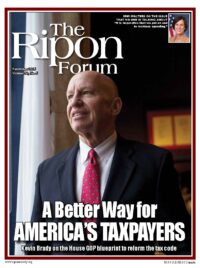
Tax reform is one of those perennial Beltway issues that is always around the corner yet is always far away (1986’s watershed act being the sole exception in living memory). Ask any tax lobbyist in Washington what the hot topics are in today’s version of the tax reform debate, and you’ll hear a long list of answers: international tax rules, how to treat business interest, business entity tax rules, the marginal tax rate on corporations, the distribution of the tax burden, cost recovery, and many other important factors.
What is often left out or is at best an afterthought is helping working families with children. Yet this element of reform can not only improve our nation’s future economic prospects, but also make all the other tax reforms possible.
Robert Stein famously argued in National Affairs that there is a very good economic reason to cut taxes on families with children: namely, the entitlement system we are laboring under requires more workers to support our aging population. Parents who raise costly, large families are in effect donating a large social good that all taxpayers benefit from. A tax code that recognizes the outsized expense and value of families is one which is more likely to have a correlative benefit of reducing the unfunded liabilities of the entitlement state. This and other human capital arguments have been a neglected consideration within tax reform.
A tax code that recognizes the outsized expense and value of families is one which is more likely to have a correlative benefit of reducing the unfunded liabilities of the entitlement state.
What’s the current state of the tax system on working families? For many, it’s a tale of two tax codes. The first tax regime is the Social Security and Medicare payroll tax burden (FICA), taken from the first dollar of wage income. It’s an absolute flat tax of 15.3 percent for non-affluent workers. What this tax lacks in progressivity it makes up for in utter simplicity: you earn $100 in wages, and $15.30 will go to Uncle Sam. Not surprisingly, for many working families with kids, the payroll tax is the largest tax they pay.
The income tax, by contrast, is steeply-progressive. There is a generous combination of a standard deduction, personal and dependent exemptions, and a $1000 child tax credit. The introductory rate on taxable income is only 10 percent. As a result, the Congressional Budget Office (CBO) reports that just under half of all taxpayers do not have an income tax liability. Within this half are many families with kids, the kind that are more working class than mass affluent.
There are two general proposals to cut taxes for these paycheck-to-paycheck families as part of fundamental tax reform. The first is to directly reduce their payroll tax burden, perhaps by exempting some portion of wages from the FICA tax base—more children means more exempted income. The challenge with this idea is that it presents some serious administrative concerns for employers and payroll companies, and that it’s not concentrated exclusively on families who need it most.
The second middle class tax cut proposal involves increasing the child tax credit. The credit, currently $1000 per child, begins to phase out at $110,000 of adjusted gross income for married couples. As a result, it’s well-targeted south of the “mass affluent” line on the earnings spectrum. House Republicans have proposed increasing the credit by 50% to $1500. Hillary Clinton has proposed doubling it to $2000. Senators Marco Rubio (R-FL) and Mike Lee (R-UT) have proposed to increase the child tax credit up to $3500. Increasing the credit but keeping the income phase-out in the current area has the advantage of targeting the credit where it is most needed. The disadvantage is that an expanded tax credit is of no use to a family without an income tax liability today unless the credit is made refundable, for example against the payroll taxes paid by the taxpayer.
It’s my assertion that any successful tax reform effort must reduce the tax burden on working families with children.
It’s my assertion that any successful tax reform effort must reduce the tax burden on working families with children. Not only can one argue that this is the right thing to do, it’s also the practical thing to do. It’s difficult to see how a tax reform package comprised entirely of business tax rate cuts, cash flow business expensing, and large tax cuts on capital savings will pass into law. Many Republicans would view such a package as balanced too much toward K Street, and Democrats would balk for similar reasons.
A healthy dose of pro-family tax relief thrown into the above pro-growth mixture changes the political support for tax reform. A payroll tax cut or a child tax credit increase would bring to the table average Republican and independent voters, who would see themselves as direct beneficiaries of the tax reform. Even Democrat families would have to admit that such a plan would be good for them. And it is that kind of support from the American people that will be essential to advancing pro-growth tax reform.
President Ronald Reagan understood this. So did President George W. Bush. So has every Republican candidate for president since Reagan. All have run on (and some have passed into law) tax relief or reform bills which are good both for business owners and capital investors on the one hand, and average working families on the other. You need both to win.
The lesson is simple: if you want tax reform, put together the whole coalition for tax reform. And that means not forgetting about families with children.
Ryan Ellis serves as Senior Advisor for Tax Policy at the Conservative Reform Network.




